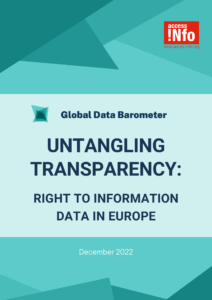Executive Summary
Once a country has an access to information law, it is essential that data is collected about how well that law is implemented, and that that data is made public. Without this measurement of transparency, it is impossible for a country to know how well it is complying with the right of access to information (RTI).
Having a legal framework for the right of access to information and levels of enjoyment of this right is one of the indicators under the Sustainable Development Goals, specifically indicator 16.10.2, which forms part of Goal 16 on Peace, Justice, and Strong Institutions. So evaluation of national access to information laws is part of the data that every country should report on as part of measuring its progress on the SDGs.
The Global Data Barometer (GDB) study evaluated whether countries have rules governing the collection of RTI implementation data and, separately, looked at levels of transparency of that data in 21 European countries: Bulgaria, Croatia, Czechia, Denmark, Estonia, Finland, France, Germany, Greece, Ireland, Italy, Latvia, Lithuania, Malta, Netherlands, Portugal, Romania, Slovakia, Spain, Sweden and the United Kingdom. For this study, data was collected for the period May 2019 to May 2021.
Overall, the GDB study found that over half countries surveyed had no rules on collection of RTI implementation data, and even those rules that do exist, do not mandate comprehensive data collection.
In practice, in ten (10) countries no data on the implementation of RTI laws was available. Furthermore, in the eleven (11) countries where data was available, it was incomplete, providing the numbers of requests, but data on response times was often missing, and data was often not broken down by public body.
When it comes to the openness of data, of the eleven (11) countries which do make data available, only six (6) published it under an open licence, and only five (5) countries published the full data set in a machine-readable format.
The GDB research included both primary data collected through surveys, and secondary data from carefully reviewed external sources. For the RTI evaluation, the external sources included the RTI Rating, a project coordinated by Access Info Europe and the Centre for Law and Democracy, which evaluates the quality of all access to information laws globally. This secondary data was used to create the RTI Legal Frameworks indicator, which was incorporated into the Political Integrity module.
Recommendations
This report contains a number of detailed recommendations, key amongst which are:
» Every country should adopt comprehensive data collection rules, which mandate all public bodies to collect and publish detailed data on the numbers of requests, response times, the nature of the responses, and data on the appeals and its outcomes.
» A central body should be mandated and empowered to oversee collection and publication of data on the implementation of access to information laws.
» Irrespective of the current legal framework, every EU country should ensure that it collects and publishes data on the implementation of access to information laws. This should be done, inter alia, as part of reporting of progress on SDG Indicator 16.10.2.
» The European Union should collect data from Member States about their access to information performance.
» The data published should contain data on, at a minimum, numbers of requests, response times, reasons for refusals, number and outcomes of appeals, and should be disaggregated by public body.
» RTI data should be published free of charge, in an open format, fully searchable and downloadable with an open licence permitting reuse.
Explore the Findings
More about the Global Data Barometer
To know more about the results of the Global Data Barometer, which surveyed 109 countries across the globe, you can visit the GDB website.
Another report on the GDB results for the European region is available: The State of Data for the Public Good in Europe
All data is also available as open data and can be downloaded and reused from the GDB website.
Disclaimer
The Global Data Barometer gathered 107,389 data points in the survey from all 109 countries and cannot guarantee that every value is error-free. Some responses might remain open to question due to different interpretation of guidance across researchers and reviewers, false negatives when sources went undiscovered, or false positives when a source has been interpreted over-generously.

